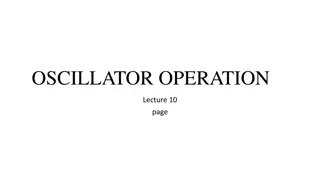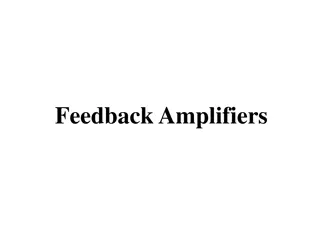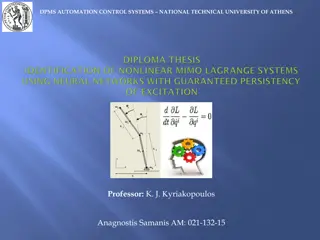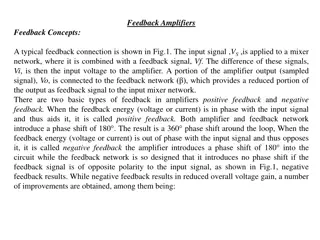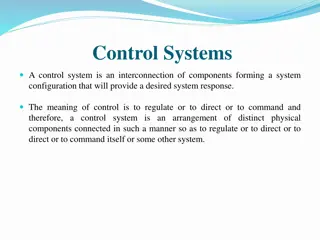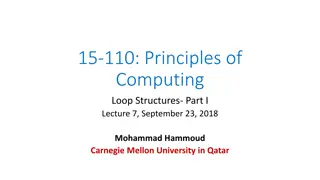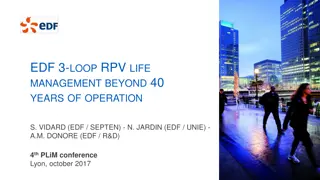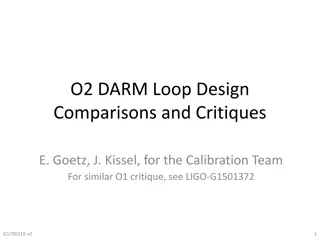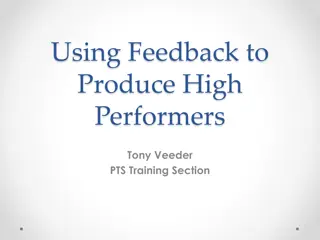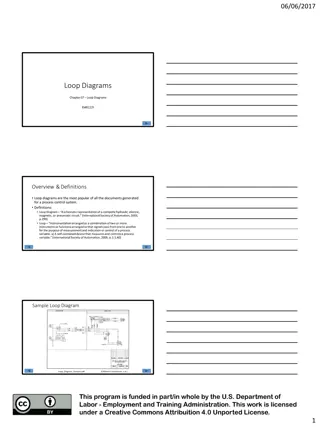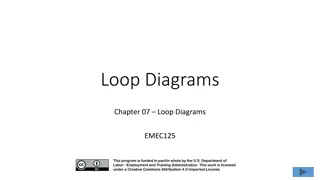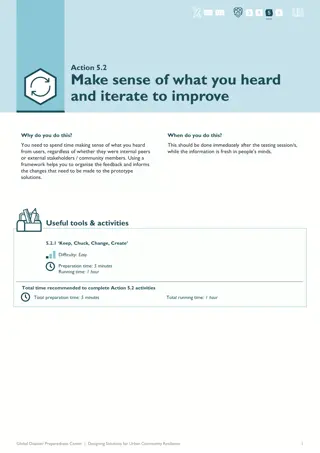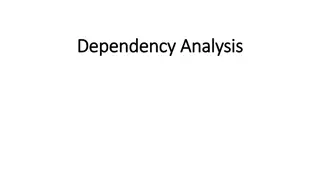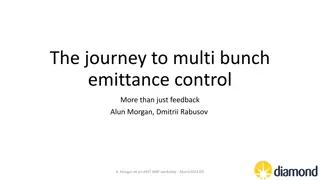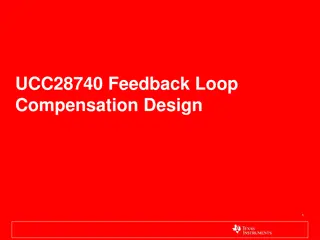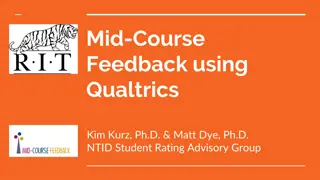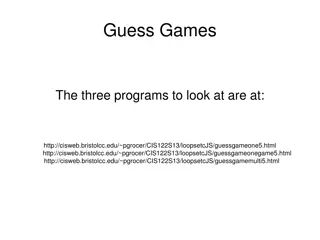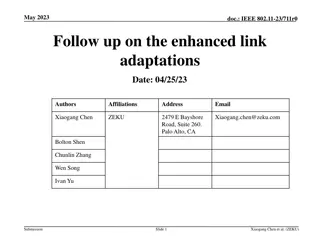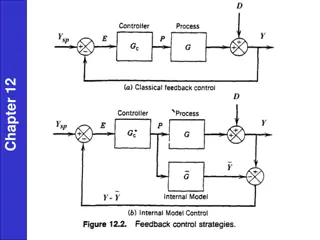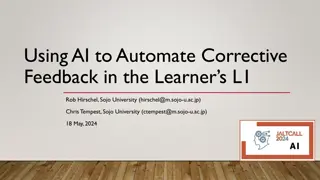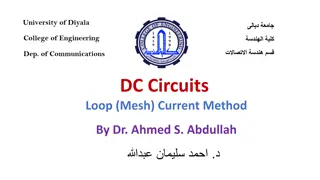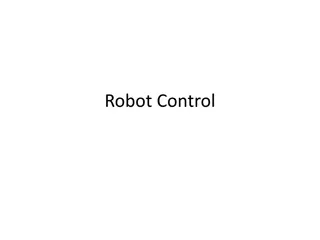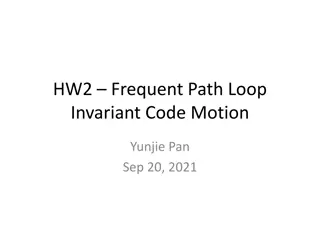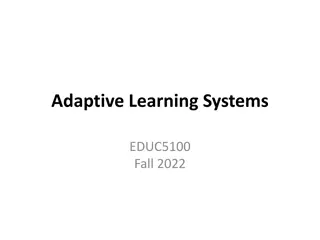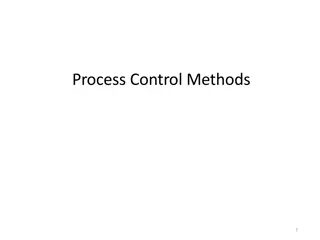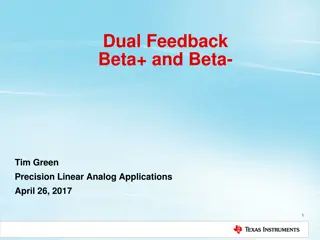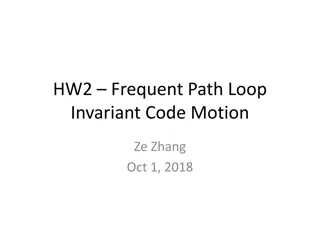Enhancing Student Learning Through Effective Feedback Strategies
Effective feedback plays a crucial role in improving student learning outcomes by providing specific information that students can use to enhance their performance. This content explores the importance of feedback, examples of good feedback practices, qualities of good feedback, and what components
5 views • 16 slides
Understanding Control Systems in Ergonomics Macro
Control systems play a vital role in regulating and managing various processes within different industries. This content delves into the fundamentals of control systems, discussing terms like input, output, plant, process, system, open-loop system, closed-loop system, transfer function, feedback con
7 views • 15 slides
Effective Feedback Strategies for Learning Enhancement
Feedback plays a crucial role in the learning process. This session focuses on strategies for providing effective feedback to improve learning outcomes, course, and assignment design, best practices, and tools for efficient feedback delivery. Understanding the importance of prompt feedback and diffe
3 views • 20 slides
Understanding Oscillator Operation and Phase-Shift Oscillators
The use of positive feedback in a feedback amplifier with closed-loop gain greater than 1 can lead to oscillation, resulting in a varying output signal. Different types of oscillators, such as sinusoidal and pulse oscillators, are discussed along with the Barkhausen criterion for oscillation. The co
1 views • 23 slides
Understanding Feedback Amplifiers: Structure, Properties, and Topologies
Electronic circuits rely heavily on feedback mechanisms, particularly negative feedback, for various purposes such as desensitizing gain, reducing distortion, controlling impedance, and improving amplifier bandwidth. This article explores the general structure of feedback, properties of negative fee
0 views • 68 slides
Enhancing Feedback Practices with Audio-Visual Technology: A Study on Student Satisfaction and Attainment
This presentation delves into the implementation of Audio-Visual Feedback (AVF) technology to improve assessment feedback practices in an educational institution. The study explores the impact of AVF on student satisfaction levels compared to traditional written feedback, as well as its influence on
0 views • 21 slides
Development of Learning Techniques in Automation Control Systems
Development of Learning Techniques in Automation Control Systems at the National Technical University of Athens focuses on system identification, parameter approximation, and achieving control goals using statistical methods and mathematical models. Techniques such as open loop form, closed loop for
0 views • 18 slides
Understanding the Importance of Feedback in Achievement Enhancement
Feedback plays a crucial role in encouraging or discouraging behavior, making it essential to provide constructive feedback that focuses on growth and improvement. Improper feedback can lead to incompetence in the workplace. Learn about the definition of feedback, how to give feedback effectively, a
2 views • 22 slides
Understanding Feedback Amplifiers in Electronic Circuits
Feedback amplifiers play a crucial role in electronic circuits by providing mechanisms for controlling gain, stability, and overall performance. There are two basic types of feedback - positive and negative, each offering distinct advantages. The four ways of connecting feedback signals involve volt
0 views • 18 slides
Understanding Control Systems for Desired System Response
A control system is an interconnection of components that regulate, direct, or command a system's response. It consists of plant, feedback, controller, and error detector components. The plant is the unit to be controlled, feedback allows automatic correction, the error detector compares inputs, and
2 views • 10 slides
Understanding Python For Loop and its Applications
The lecture discusses the principles of computing loop structures, focusing on the for loop in Python. It explains the general form of a for loop, its flowchart, and provides an example of computing the average of a series of numbers using a for loop. The session highlights the importance of control
0 views • 19 slides
Enhancing Feedback Strategies in ELA Learning Project Day
Refine understanding of ELA, engage with student exemplars, and design constructive feedback in a structured agenda. Activities include generating feedback, digging deeper into feedback processes, and considering the impact of timely and specific feedback on student growth in learning and skills. Co
0 views • 31 slides
Effective Feedback Strategies for Resident Teachers
Effective feedback is critical for the growth of resident teachers. This guide covers types of feedback, why it's important, what makes feedback effective, behaviorally anchored rating scales, models for giving feedback, and key tips for delivering feedback successfully.
0 views • 14 slides
EDF 3-Loop RPV Life Management Beyond 40 Years of Operation
Ageing management process is crucial for EDF's Long Term Operation policy, focusing on safety-related components like mechanical, electrical, and civil works. The process involves selecting structures/components prone to ageing mechanisms, identifying relevant ageing mechanisms, and implementing act
0 views • 23 slides
Comparison and Critique of DARM Loop Design for Calibration Team
This document provides detailed comparisons and critiques of the DARM loop design, focusing on aspects such as open loop gain transfer function, actuator strength, hierarchy filters, and DARM filter and sensing function. Key points include variations in UGF, phase margins, gain margin, actuator comp
0 views • 26 slides
Effective Feedback Strategies for High Performance
Feedback plays a crucial role in helping individuals improve performance and reach their full potential. From providing helpful feedback to reinforcing desired behaviors, this guide explores various strategies, including redirection, reinforcement, and F.A.S.T. feedback, to enhance workplace perform
0 views • 21 slides
Overview of Loop Diagrams in Process Control Systems
Loop diagrams are essential documents in process control systems, providing schematic representations of hydraulic, electric, magnetic, or pneumatic circuits. They detail instrumentation arrangements, signal connections, power connections, and termination information. Guidelines and standards for cr
1 views • 5 slides
Comprehensive Guide to Loop Diagrams in Process Control Systems
Loop diagrams are essential documents in process control systems, depicting hydraulic, electric, magnetic, or pneumatic circuits. This comprehensive guide covers loop diagram definitions, components, guidelines, development stages, and instrument connection symbols. It explains what loop diagrams en
0 views • 13 slides
Enhancing Postgraduate Academic Writing: Feedback Collaboration Model
Developing a collaborative model for postgraduate academic writing courses involves understanding the role of feedback, focusing on content feedback, and exploring the intersections between discipline specialist and writing tutor feedback to improve academic writing abilities. Feedback offers valuab
1 views • 27 slides
Understanding Geothermal Systems and Heat Exchangers
This content provides a comprehensive overview of geothermal systems, focusing on open and closed loop heat exchangers. It covers basic geothermal terminology, loop configurations, thermal conductivity tests, and the efficiency of closed loop systems. Key concepts like heat pump basics and the influ
0 views • 21 slides
Iterative Feedback Framework for Prototype Improvement
The iterative feedback framework involves making sense of user feedback using the Keep, Chuck, Change, Create (KCCC) model to iterate and enhance prototype solutions. This process helps organize input from testing sessions, informing necessary modifications for better outcomes. The framework emphasi
1 views • 26 slides
Understanding Data Dependencies in Nested Loops
Studying data dependencies in nested loops is crucial for optimizing code performance. The analysis involves assessing dependencies across loop iterations, iteration numbers, iteration vectors, and loop nests. Dependencies in loop nests are determined by iteration vectors, memory accesses, and write
0 views • 15 slides
Enhancing Emittance Control Strategies in Particle Accelerators
The journey to multi-bunch emittance control goes beyond mere feedback mechanisms, involving nuances like pinhole cameras as detectors and skew quadrupole magnets as actuators. This innovative approach aims to overcome limitations of existing systems like coupling control issues and hysteresis perfo
0 views • 16 slides
Feedback Loop Compensation Design Using UCC28740 for Voltage Regulation
Explore the detailed design and control laws for a feedback loop compensation system using UCC28740 in a flyback regulator schematic diagram. The control law profile in CV mode, multiple control regions, and gain blocks are discussed for achieving high efficiency in voltage regulation. Gain blocks d
0 views • 16 slides
Understanding Mid-Course Feedback Using Qualtrics
Mid-Course Feedback (MCF) is a valuable process that allows students to provide feedback on their courses mid-semester, impacting teaching strategies, communication, materials, and more. This feedback benefits both students and instructors by improving teaching effectiveness, student satisfaction, a
0 views • 21 slides
JavaScript Guess Number Game - Loop Implementation
In this JavaScript guessing game, a random number is generated, and the user is prompted to guess the number. If the guess is incorrect, the user receives feedback on whether the guess was too high or too low. A loop using a do...while statement is implemented to allow the user to keep guessing unti
0 views • 14 slides
IEEE 802.11-23/711r0 May 2023 Document Summary: Enhanced Link Adaptation Discussions
The May 2023 document IEEE 802.11-23/711r0 discusses topics like beamforming feedback, closed-loop rate adaptations, and issues related to beamforming feedback in a wireless communication context. It elaborates on the challenges of feedback optimization and post-SNR degradation, suggesting solutions
0 views • 15 slides
Importance of Student and Staff Feedback in Educator Evaluation
Student and staff feedback plays a crucial role in educator evaluation, providing valuable insights into areas of strength and growth. Informed by evidence such as surveys, observations, and artifacts, feedback helps educators tailor their practice, fostering two-way communication and professional d
0 views • 14 slides
Understanding Cascade Control Systems in Industrial Processes
Cascade control systems play a crucial role in improving process control efficiency by incorporating feedback loops within feedback loops. This type of control architecture helps to better handle disturbances and variations in the process by creating secondary loops that monitor specific parameters.
0 views • 8 slides
Control System Synthesis and Compensation Techniques
Explore various chapters discussing topics like direct synthesis, closed-loop transfer functions, PI controllers, time delay compensation, and Smith predictor approach in control systems. Learn about modeling feedback controllers, closed-loop performance, and response specifications.
0 views • 9 slides
AI Automation for Corrective Feedback in Language Learning
Exploring the utilization of AI technology to automate and enhance corrective feedback in language learning, addressing challenges such as time constraints, delayed feedback, and student comprehension. Introduction of a new AI text tool by Marcus Green for accessible and effective feedback provision
0 views • 13 slides
Understanding DC Circuits: Mesh Current Method by Dr. Ahmed S. Abdullah
The DC Circuits Loop (Mesh) Current Method, explained by Dr. Ahmed S. Abdullah, applies Kirchhoff's Voltage Law (KVL) to find unknown currents in a circuit. This method involves assigning loop currents to loops, applying KVL to each loop, and indicating voltage polarities across all resistors based
0 views • 31 slides
IEEE 802.11-19/0709r0 - Immediate and Delayed Feedback May 2019
The document discusses immediate and delayed feedback mechanisms in IEEE 802.11-19/0709r0, focusing on parameters, feedback types, and ranging options. It explores variations in feedback direction and types, proposing options for phase shift feedback and distinguishing between RSTA-to-ISTA and ISTA-
0 views • 6 slides
Product Feedback Forum at NWS: Provisional PS-PVR User Feedback on ABI, CMI, and L1b
A comprehensive feedback system managed by PRO at NWS, focusing on user input for GOES-R products such as ABI, CMI, and L1b. The forum gathers feedback through surveys and weekly calls, addressing product quality issues and ensuring effective communication with field sites. Noteworthy discussions in
0 views • 18 slides
Understanding Control Systems in Robotics
Exploring the concepts of open-loop control, closed-loop control (feedback control), goals, error measurement, feedback systems, and real-world feedback examples in the context of robotics. Control systems play a crucial role in directing robots to achieve desired states efficiently. Discover the si
0 views • 33 slides
Loop Invariant Code Motion in Frequent Paths for Optimization
Loop Invariant Code Motion (LICM) is a key optimization technique that identifies and moves code operations whose operands remain constant within a loop to improve performance. The process involves careful consideration of memory operations and operations not executed every iteration. The assignment
0 views • 20 slides
Understanding Feedback in Learning Systems
Exploring the role of feedback in educational settings, this content delves into the concept of providing information to learners by various agents. It discusses the importance of feedback in guiding learning progress, highlighting examples of correctness feedback and correct answer feedback. The be
0 views • 66 slides
Process Control Methods and Systems Overview
Process control involves different methods such as open-loop and closed-loop control systems to ensure a controlled variable remains at a desired set-point. Open-loop systems operate without feedback, while closed-loop systems are more effective by incorporating a feedback loop for self-regulation.
0 views • 38 slides
Precision Linear Analog Circuit Analysis
Explore the detailed analysis of a precision linear analog circuit, featuring dual feedback configurations, beta values, control loop derivations, and loop gain calculations. The content covers key components, such as operational amplifiers and resistors, and explains how to derive closed-loop gain,
0 views • 18 slides
Loop Invariant Code Motion (LICM) in LLVM
Loop Invariant Code Motion (LICM) is a technique used in LLVM to move operations that do not change within a loop outside of the loop, improving performance by executing them only once per loop iteration. This process must be done carefully to handle memory operations and operations that are not exe
0 views • 19 slides



